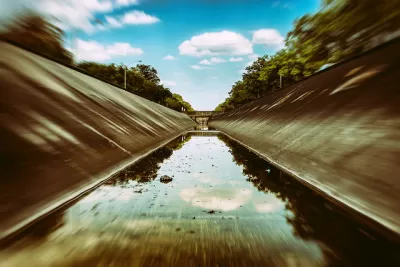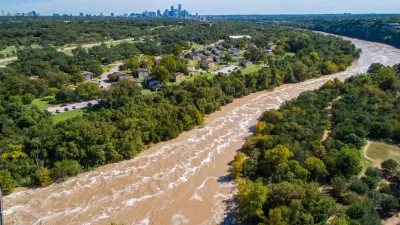Infrastructure built to mitigate flooding a century ago no longer serves current needs.

A new study from the University of Michigan reveals that stormwater infrastructure in many U.S. cities actually exacerbates flooding due to outdated designs that are no longer effective during extreme weather events, reports Jim Lynch for Tech Xplore.
The problem lies in traditional planning's failure to recognize flood connectivity: how surface runoff from driveways, lawns and streets—and the flows in river channels and pipes—are all interlinked. The result is interactions, often unanticipated, between different stormwater systems that can make flooding worse.
The study used data from flooding in Metro Detroit in 2014, when record-breaking rainfall caused $1.8 billion in damage. According to Vinh Tran, U-M assistant research scientist in civil and environmental engineering and co-first author of the study, “Current flood mapping practices are indicative of outdated thinking that needs to change.” Policy recommendations based on that data include:
- “Stormwater system designs should take a holistic, systemwide approach to flood mitigation, rather than the conventional approach focused on local solutions.”
- “Design guidelines for stormwater systems should be revised to consider connectivity in urban landscapes, including flows in subsurface infrastructure such as pipes and sewers, open channel flows such as rivers and streams, and overland flows over natural and built surfaces.”
- “Advanced computer models that represent the full spectrum of stormwater elements and the behavior of water in them should be mandated.”
FULL STORY: Traditional infrastructure design often makes extreme flooding events worse, researchers find

Planetizen Federal Action Tracker
A weekly monitor of how Trump’s orders and actions are impacting planners and planning in America.

Congressman Proposes Bill to Rename DC Metro “Trump Train”
The Make Autorail Great Again Act would withhold federal funding to the system until the Washington Metropolitan Area Transit Authority (WMATA), rebrands as the Washington Metropolitan Authority for Greater Access (WMAGA).

The Simple Legislative Tool Transforming Vacant Downtowns
In California, Michigan and Georgia, an easy win is bringing dollars — and delight — back to city centers.

The States Losing Rural Delivery Rooms at an Alarming Pace
In some states, as few as 9% of rural hospitals still deliver babies. As a result, rising pre-term births, no adequate pre-term care and "harrowing" close calls are a growing reality.

The Small South Asian Republic Going all in on EVs
Thanks to one simple policy change less than five years ago, 65% of new cars in this Himalayan country are now electric.

DC Backpedals on Bike Lane Protection, Swaps Barriers for Paint
Citing aesthetic concerns, the city is removing the concrete barriers and flexposts that once separated Arizona Avenue cyclists from motor vehicles.
Urban Design for Planners 1: Software Tools
This six-course series explores essential urban design concepts using open source software and equips planners with the tools they need to participate fully in the urban design process.
Planning for Universal Design
Learn the tools for implementing Universal Design in planning regulations.
Smith Gee Studio
City of Charlotte
City of Camden Redevelopment Agency
City of Astoria
Transportation Research & Education Center (TREC) at Portland State University
US High Speed Rail Association
City of Camden Redevelopment Agency
Municipality of Princeton (NJ)





























